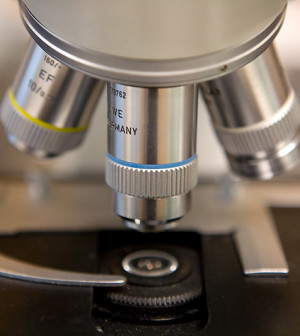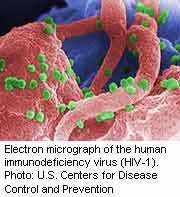- Double Mastectomy May Offer No Survival Benefit to Women With Breast Cancer
- Toxic Lead Found in Cinnamon Product, FDA Says
- Certain Abbott Blood Sugar Monitors May Give Incorrect Readings
- Athletes Can Expect High Ozone, Pollen Counts for Paris Olympics
- Fake Oxycontin Pills Widespread and Potentially Deadly: Report
- Shingles Vaccine Could Lower Dementia Risk
- Your Odds for Accidental Gun Death Rise Greatly in Certain States
- Kids From Poorer Families Less Likely to Survive Cancer
- Tough Workouts Won’t Trigger Cardiac Arrest in Folks With Long QT Syndrome
- At-Home Colon Cancer Test Can Save Lives
HIV Resistance Mapped by Gene Researchers


THURSDAY, Oct. 31Researchers who created the first map of human resistance to HIV say their achievement could lead to improved treatments for the virus, which causes AIDS.
When a person is infected with HIV, the immune system tries to destroy the virus. In order to thwart those attacks, HIV undergoes millions of genetic mutations a day. In most cases, this tactic enables HIV to defeat the immune system.
However, some people’s immune systems manage to hold HIV at bay without any treatment.
“The virus survives but replicates more slowly, and thus its capacity for destruction is in some sense neutralized,” study co-author Jacques Fellay, of the Swiss Federal Institute of Technology in Lausanne, said in an institute news release.
In this study, Fellay and fellow geneticists used a supercomputer to analyze immune system-triggered mutations in the genomes of a variety of strains of HIV from more than 1,000 patients.
The findings improve understanding of how the immune system tries to defend against HIV and how HIV adapts to that defense, according to the study published Oct. 29 in the journal eLife.
By studying people’s natural defenses against HIV, it may be possible to develop new treatments and individualized therapies that take into account patients’ genetic strengths and weaknesses, the researchers suggested.
More information
The U.S. National Institute of Allergy and Infectious Diseases has more about HIV/AIDS.
Source: HealthDay
Copyright © 2024 HealthDay. All rights reserved.










